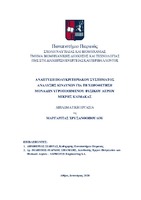Aνάπτυξη πολυκριτηριακού συστήματος ανάλυσης κινδύνων για τη χωροθέτηση μονάδων υγροποιημένου φυσικού αεριού μικρής κλίμακας

Master Thesis
Συγγραφέας
Χρυσανθοπούλου, Μαργαρίτα
Ημερομηνία
2020-01Προβολή/
Λέξεις κλειδιά
Υγροποιημένο φυσικό αέριο ; Χωροθέτηση ; Διαδικασία Αναλυτικής Ιεράρχησης ; Liquefied Natural Gas (LNG) ; Analytic Hierarchy Process (AHP) ; Site selectionΠερίληψη
Η αυξανόμενη ζήτηση ενέργειας και η ανάγκη ενεργειακής μετάβασης σε καθαρότερες μορφές ενέργειας, έχουν συντελέσει τις τελευταίες δεκαετίες στην προώθηση του φυσικού αερίου(ΦΑ), το οποίο λόγω των χαμηλότερων εκπομπών του σε αέρια του θερμοκηπίου θεωρείται καθαρότερη πηγή ενέργειας σε σύγκριση με τα υπόλοιπα ορυκτά καύσιμα, όπως είναι το πετρέλαιο και ο άνθρακας. Το ΦΑ συνήθως εισάγεται με αγωγούς μεταξύ των περιοχών εξαγωγής και εισαγωγής του. Ωστόσο, συχνά τα αποθέματα ΦΑ βρίσκονται μακριά από τις περιοχές ζήτησης, με αποτέλεσμα η μεταφορά του με αγωγούς να καθίσταται τεχνολογικά και οικονομικά ανέφικτη λύση. Ως εκ τούτου, προτιμάται να μεταφέρεται σε υγρή μορφή, ως υγροποιημένο φυσικό αέριο (ΥΦΑ), παρουσιάζοντας αρκετά πλεονεκτήματα στην εφοδιαστική ευελιξία του καυσίμου. Μέχρι στιγμής, η πλειονότητα των έργων ΥΦΑ αφορούσε έργα μεγάλης κλίμακας. Εντούτοις, πρόσφατα εμφανίστηκαν ορισμένα έργα μικρής κλίμακας που αποτελούν περιφερειακούς εφοδιαστικούς κόμβους αποθήκευσης, τα οποία παρουσιάζουν αρκετές δυνατότητες ως προς την λειτουργικότητα και την επεκτασιμότητά τους. Οι μονάδες ΥΦΑ μικρής κλίμακας (Small Scale LNG plants), θεωρείται ότι μπορούν να συνεισφέρουν αποτελεσματικά στην βιώσιμη ενεργειακή ανάπτυξη περιοχών που βρίσκονται μακριά από τα εγκατεστημένα δίκτυα διανομής ΦΑ, όπως είναι η περίπτωση των ελληνικών νησιών, καθώς και άλλων απομακρυσμένων περιοχών στην ελληνική επικράτεια.
Στα πλαίσιο αυτό, η παρούσα διπλωματική στοχεύει στην διερεύνηση του αντικειμένου της χωροθέτησης μιας μονάδας μικρής κλίμακας ΥΦΑ, με μελέτη περίπτωσης το νησί της Χίου. Η αναζήτηση της επικρατέστερης θέσης για την χωροθέτηση πραγματοποιείται προτείνοντας μια μεθοδολογία που βασίζεται στην ανάλυση και την αξιολόγηση του κινδύνου έργου, όπου η αξιολόγηση των πιθανών εναλλακτικών θέσεων προκύπτει μέσω της ανάλυσης των παραπάνω κινδύνων. Η εύρεση των κινδύνων που απαντώνται στα έργα ΥΦΑ μικρής κλίμακας προκύπτει πρώτον από την αναζήτηση των κινδύνων που λαμβάνονται υπόψη γενικότερα στα τεχνικά έργα, δεύτερον από τους κινδύνους ασφαλείας που ενέχει η μεταφορά και αποθήκευση του ΥΦΑ, καθώς και από τις απαιτήσεις τις ελληνικής νομοθεσίας που αφορούν τα εν λόγω έργα. Ως εργαλείο για τον προσδιορισμό της πιθανότητας των κινδύνων, η οποία ως ποσοτικό μέγεθος αντιπροσωπεύει τα κριτήρια αξιολόγησης των εναλλακτικών θέσεων, καθώς και για τη σύγκριση των εναλλακτικών θέσεων ως προς τους κινδύνους αυτούς, χρησιμοποιείται η Διαδικασία Αναλυτικής Ιεράρχησης (Analytic Hierarchy Process-AHP), που είναι μέθοδος Πολυκριτηριακής Ανάλυσης με ευρεία χρήση στη λήψη επιχειρησιακών αποφάσεων. Oι συγκρίσεις γίνονται μέσω ερωτηματολογίων με τη βοήθεια ομάδας εμπειρογνωμόνων με μακροχρόνια συμμετοχή σε έργα της βιομηχανίας του ΥΦΑ. Τέλος, στόχος της διπλωματικής αποτελεί η απόδειξη της προτεινόμενης μεθοδολογίας ως ένα ευέλικτο και χαμηλού κόστους εργαλείο χρήσιμο για το ζήτημα της χωροθέτησης των μονάδων ΥΦΑ.
Τα συμπεράσματα που εξάγονται από την εργασία αρχικά αφορούν τους κινδύνους που απαντώνται στη χωροθέτηση μονάδων ΥΦΑ μικρής κλίμακας. Επιπλέον, μέσω της μεθόδου AHP, αναδεικνύονται οι πιο σημαντικοί κίνδυνοι, που είναι οι Κίνδυνοι Ασφαλείας και οι Τεχνοοικονομικοί Κίνδυνοι. Ακόμη προκύπτει η επικρατέστερη θέση για την χωροθέτηση της μονάδας, η οποία συγκεντρώνει την υψηλότερη επίδοση συγκριτικά με τις υπόλοιπες 3 εναλλακτικές. Τέλος, η αξιοπιστία της μεθόδου και η ορθότητα της απόφασης επιβεβαιώνονται από τον έλεγχο συνέπειας της AHP, καθώς και μέσω της ανάλυσης ευαισθησίας που πραγματοποιείται στους δύο πιο σημαντικούς κινδύνους. Συνεπώς, η μέθοδος AHP διαπιστώνεται ότι αποτελεί ευέλικτο, γρήγορο και αποδοτικό τρόπο ανάλυσης των κινδύνων σε έργα χωροθέτησης μονάδων ΥΦΑ μικρής κλίμακας, τα οποία την καθιστούν χρήσιμο εργαλείο στον τομέα αυτό.

